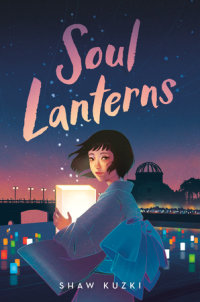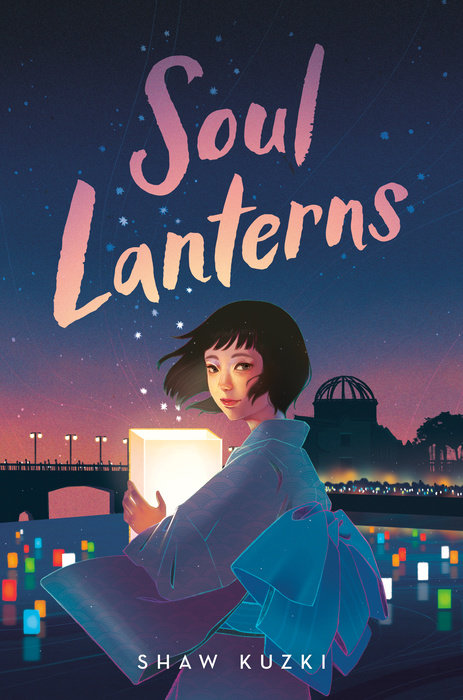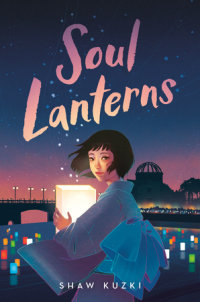Soul Lanterns
The haunting and poignant story of a how a young Japanese girl's understanding of the historic and tragic bombing of Hiroshima is transformed by a memorial lantern-floating ceremony.
A Kirkus Reviews Best Middle Grade Book of the Century
Twelve-year-old Nozomi lives in the Japanese city of Hiroshima. She wasn't even born when the bombing of Hiroshima took place. Every year Nozomi joins her family at the lantern-floating ceremony to honor those lost in the bombing. People write the names of their deceased loved ones along with messages of peace, on paper lanterns and set them afloat on the river. This year Nozomi realizes that her mother always releases one lantern with no name. She begins to ask questions, and when complicated stories of loss and loneliness unfold, Nozomi and her friends come up with a creative way to share their loved ones' experiences. By opening people's eyes to the struggles they all keep hidden, the project teaches the entire community new ways to show compassion.
Soul Lanterns is an honest exploration of what happened on August 6, 1945, and offers readers a glimpse not only into the rich cultural history of Japan but also into the intimate lives of those who recognize--better than most--the urgent need for peace.
An Excerpt fromSoul Lanterns
1
The Strange Question
The way the old woman asked so pointedly, Nozomi didn’t even hesitate before answering.
“I’m twelve.”
The old woman shook her head and murmured something under her breath.
It sounded like “That can’t be. . . .”
Nozomi felt shy for no real reason and lowered her eyes. When she saw the woman’s worn-out shoes, she somehow felt like she had said something wrong. She looked away from her feet and added, “But I only just turned.”
After remaining silent for a moment, the woman asked, her face tense, “Do you have an elder sister?”
When Nozomi shook her head and answered that she only had a younger brother, the woman looked disappointed. Then she started to walk away, but turned on her heel and came back.
The clinging look in the old woman’s eyes frightened Nozomi, but she was rooted to the spot.
“How old is your mother?”
“She’s forty-two.”
Upon hearing her reply, the woman took a hard look at Nozomi’s face. Suddenly, there were tears forming in her eyes.
Nozomi was startled, and the old woman apologized repeatedly, “I’m sorry, I’m sorry,” as she fairly fled into the darkness.
Dumbfounded, Nozomi watched her go.
On their way home, Nozomi’s grandma was walking with some friends from the neighborhood. Her mother, walking a few paces behind them, seemed to be pondering something.
Nozomi’s mother had a more or less sunny personality, but when she was alone, she tended to read books and lose herself in thought. When Nozomi was little, she often felt, Mommy’s not here right now. She would get impatient and whine. Now that she was older, she was capable of giving her mother some space when her mind was elsewhere, but this time she couldn’t help but start a conversation. The shock of her interaction with the old woman still hadn’t worn off.
“Ah, that was freaky.”
“What happened?” her mother inquired absentmindedly.
When Nozomi told her about the strange old woman, she stopped in her tracks. Nozomi stopped, too.
“And then she asked me, ‘Do you have an elder sister? How old is your mother?’ ”
“How old is your mother?” her mother simply repeated, but she set off walking again at a quick clip.
Hurrying to catch up to her, Nozomi commented jokingly, “I must look like someone she knows. Or maybe you do?”
Everyone said she looked just like her mother, but Nozomi wondered if that was really true. Her mother’s face was slender, while hers was round.
Whenever she mentioned that, though, her mother would reply, “I had chubby cheeks when I was your age,” and smile.
But now, instead of smiling, she said in a quiet voice, “There are still so many people looking for someone in Hiroshima.”
That was true. Nozomi sometimes saw a man catching up to someone and grabbing their arm or a woman peering into the face of every person who passed by.
The morning of the atomic bomb, more than seventy thousand people were lost in an instant. Nozomi and her friends learned in their peace studies class that those people truly just “vanished.” The temperature at ground zero rose to over seven thousand degrees, boiling blood and melting flesh. One person’s shadow was even burned into stone steps.
Still, listening to her teacher, reading testimonies, seeing pictures, and visiting the Peace Memorial Museum, Nozomi had a hard time believing that something like that had really happened. Could people really vanish in an instant? Leaving behind only a shadow? It was difficult to imagine.
Surely everyone felt that way. Which was why so many people couldn’t believe their loved ones were gone and continued looking for them to this day. They clung to the idea that their family members, sweethearts, and friends had survived and were still out there somewhere.
“That old lady must have been looking for someone, too,” said Nozomi.
“Someone who looks a lot like you.”
“But it happened twenty-five years ago, ri--” Mid-question, Nozomi noticed her mother’s face. She looked awfully pale, even though it was the kind of summer night that made you sweaty standing still.
Could it be that that lady was looking for her missing daughter, and it’s my mom? She grew up, got married, and had a kid who looks just like Mom. Maybe that’s why she asked how old she was. . . . And now my mom realized that and is wondering what to do . . . ?
Nozomi pictured Gramma, her grandmother on her mother’s side.
Maybe Gramma adopted Mom, and Mom’s real mom is this lady?
Nozomi loved stories, so when she read Alone in the World or The Prince and the Pauper, she often amused herself by imagining that she was really a kidnapped princess or the daughter of a rich family with no obnoxious little brother. She had never imagined her mother in any of those scenarios, but once she started daydreaming, she felt like it almost sort of made sense.
No way. It can’t be.
“I’m going ahead,” she told her mother, and raced on as fast as she could to clear the old woman’s tense expression--and the daydream, which was strange even for her--out of her head. Akiyuki took off right after her.
It was after Nozomi and Akiyuki arrived home that their mother and grandma got back. They went straight to the family altar, made an offering of incense, and prayed. Nozomi and Akiyuki sat quietly in a respectful posture behind them.
When it was Akiyuki’s turn to offer incense, Nozomi was relieved to hear their mother chide him, “Don’t blow it out. Use your hand to fan it.” Maybe her pale face earlier had only been in Nozomi’s head.
Since the beginning of August, a flame had burned continuously at the altar. It was a sign to guide the returning spirits.
The altar contained the spirit tablets of all the people who were supposed to come back: their grandpa, their dad’s two younger sisters, and one more--their dad’s previous wife.
Their dad had made it back from a concentration camp years after the war ended and married again, this time to their mother, and then Nozomi and Akiyuki were born.
The lanterns their grandma had released bore the names of her two daughters: Yoshiko and Kyoko. They had both still been just students. They’d fallen victim to the bomb while they were out demolishing buildings as part of the student mobilization.
The green lantern their mother had released bore the name of their dad’s former wife, Kumiko.
The house was about a mile and a half from the blast, but both Kumiko and their grandma had been thrown off their feet as they were working out in the fields. They both got burned from the waist down. Later they learned that it was because the black parts of their work pants absorbed the light. Some people even got burns in the shapes of the patterns on their clothes.
An acquaintance brought Yoshiko and Kyoko, who were badly burned, home in his truck. Though Nozomi’s grandma and Kumiko weren’t feeling well themselves, they went without sleep to care for the girls. When both daughters drew their last breaths one after the other, Nozomi’s grandma became bedridden.
Kumiko pulled the dead sisters’ bodies on an old cart to the place where people were being cremated.
After that, Kumiko continued looking after her mother-in-law and managing the household, but she grew weaker and weaker, and one morning at the end of the summer, she was found cold.
She must have thought she could still work. Nozomi had heard that her apron was folded neatly near her pillow, and in its pocket was a little scrap of paper. She had written a list of all the things she needed to do around the house, and of the five, only the first was crossed off.
She had been raised to be sophisticated and was talented in the flower-arranging art of ikebana, but she promised her husband, Satoru, when he went to war that she would “look after the home front,” and she bravely faced any challenges that came her way. She hadn’t even turned twenty yet.
In the picture of Kumiko on display in the altar room, she looked like a slender, delicate child. Nozomi had a hard time imagining her pulling a cart laden with two dead people.
Kumiko’s name had been written on the green lantern. But the other lantern Nozomi’s mother released, the white one, didn’t have a name.
I wonder who that lantern was for. . . .
As Nozomi offered incense at the altar, the white lantern came to mind. She thought maybe it was for someone who wasn’t represented on the family altar.
It happened later that day. The night was breezeless and muggy. When Nozomi woke up to go to the bathroom, she noticed a ray of light spilling from the door to the altar room.
She thought maybe the votive lights had just been left on, but when she peeked through the gap in the sliding screen door, her mother was sitting alone before the altar. Nozomi was about to call out to her when she realized with a start that her mother was softly crying. There was a small paper package in her hands, but by the votive lights alone, Nozomi couldn’t tell what it was.
She looked at her mother’s face again. She was still looking down at the package and crying when she abruptly turned to face a different direction. There was an ornate rosewood cabinet to the left of the altar, and she opened one of its drawers, put the package in there, and quietly closed it again. Then she turned back to the altar and brought her hands together.
Nozomi tiptoed away and went back to her room.



